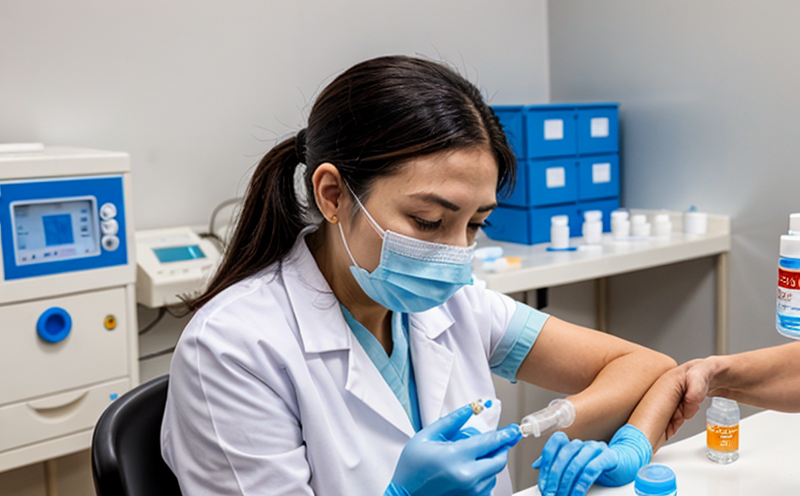ELISA Immunogenicity Testing of Vaccine Candidates
In the rapidly evolving landscape of pharmaceutical testing, particularly in vaccine development, ensuring the safety and efficacy of new vaccine candidates is paramount. ELISA (Enzyme-Linked Immunosorbent Assay) immunogenicity testing plays a critical role in this process by assessing the immune response to these candidate vaccines.
ELISA testing helps identify whether a vaccine is likely to generate an immune response that could lead to adverse reactions or provide protective immunity. This test measures antibodies produced against specific antigens present within the vaccine. The results of ELISA tests are essential for regulatory approval and subsequent clinical trials, ensuring that only safe and effective vaccines reach the market.
The procedure involves several steps, including sample preparation, antibody coating, incubation periods, washing steps, enzymatic reactions, and colorimetric detection. Each step is crucial to ensure accurate measurement of immune responses. The accuracy of ELISA testing relies heavily on standard operating procedures (SOPs) that are meticulously followed.
For vaccine candidates targeting various pathogens such as influenza, tuberculosis, or HIV, ELISA tests can help determine the optimal dosage and formulation that will trigger an appropriate immune response without causing undue harm. This capability is critical for both experimental vaccines being developed in R&D phases and commercial products undergoing quality assurance checks.
The significance of this test extends beyond mere compliance with regulatory bodies like the FDA or EMA; it also ensures patient safety by minimizing risks associated with adverse reactions. By accurately quantifying immune responses, ELISA tests provide valuable insights into vaccine performance early on in development stages.
- Speedy Results: Provides rapid feedback on candidate vaccines' potential to induce desired immune responses.
- Precision Measurement: Accurate measurement of specific antibodies produced by the body against targeted antigens.
- Standardized Procedure: Adherence to internationally recognized standards ensures consistent results across labs worldwide.
- Compliance Assurance: Ensures adherence to regulatory requirements for vaccine approval and quality assurance.
The use of ELISA in immunogenicity testing is not limited to just one type of vaccine; it can be applied broadly across different platforms including recombinant proteins, viral vectors, or whole-cell preparations. The versatility of this technology makes it an indispensable tool in modern pharmaceutical research and development.
In conclusion, ELISA immunogenicity testing serves as a cornerstone in the evaluation process for vaccine candidates. Its ability to provide precise measurements of immune responses allows researchers and manufacturers to make informed decisions about dosage levels, safety profiles, and overall efficacy. This technology supports not only regulatory compliance but also enhances patient safety by identifying potential issues early in development.
Why Choose This Test
- Accurate Measurement: ELISA provides precise quantification of antibodies produced against specific antigens, which is crucial for understanding the immune response to a vaccine candidate.
- Rapid Turnaround Time: The assay can produce results quickly, allowing for timely adjustments in the development process if necessary.
- High Sensitivity and Specificity: ELISA tests are highly sensitive and specific, ensuring accurate identification of antibodies relevant to vaccine efficacy.
- Comprehensive Data Collection: Provides detailed information about various aspects of the immune response, aiding in comprehensive analysis.
The ability to generate reliable data swiftly is particularly beneficial during clinical trials and post-market surveillance. By leveraging ELISA technology, pharmaceutical companies can ensure they are adhering to stringent quality control measures while simultaneously advancing their pipeline projects efficiently.
Moreover, the standardized nature of ELISA makes it a preferred choice among laboratories globally. This consistency in methodology across different institutions ensures comparability of results, which is essential for collaborative research efforts and regulatory submissions.
Quality and Reliability Assurance
The quality assurance process within our laboratory adheres strictly to international standards such as ISO 17025. This certification guarantees that all testing procedures are conducted under controlled conditions, ensuring accuracy and reproducibility of results.
To maintain this high standard, we employ highly trained professionals who possess extensive experience in conducting ELISA tests specifically for vaccine candidates. Our state-of-the-art facilities equipped with advanced instrumentation further enhance the precision and reliability of our findings.
Data integrity is paramount in any scientific investigation, especially when dealing with human health products like vaccines. Therefore, stringent protocols are implemented to prevent contamination or errors during sample handling, preparation, and analysis. Regular calibration checks ensure that all equipment remains accurate throughout its operational life cycle.
Our commitment to excellence extends beyond just technical proficiency; it includes continuous improvement through ongoing training programs for our staff members. By staying abreast of the latest advancements in ELISA technology, we ensure that our services remain cutting-edge and relevant.
In summary, by choosing our laboratory for ELISA immunogenicity testing of vaccine candidates, clients can be assured not only of top-notch technical expertise but also of adherence to best practices that uphold the highest standards of integrity and reliability.
Competitive Advantage and Market Impact
The successful implementation of ELISA immunogenicity tests offers significant competitive advantages in the pharmaceutical industry. Early identification of potential issues regarding vaccine candidates can prevent costly delays down the line, thereby shortening time-to-market for new products.
By providing robust data on immune responses early in development stages, our laboratory helps clients make well-informed decisions about dosage levels and formulations that will yield optimal results without compromising safety. This strategic insight enables pharmaceutical companies to focus their resources more effectively, leading to greater efficiency in R&D efforts.
The precision and speed of ELISA testing also contribute positively towards enhancing reputation among stakeholders including regulators, investors, and consumers alike. A strong track record built on accurate, reliable data fosters trust which translates into better business relationships overall.
Furthermore, the ability to demonstrate compliance with stringent quality assurance measures can significantly impact market positioning by distinguishing one's offerings from competitors who may not adhere as closely to these standards. In an increasingly competitive marketplace, this level of commitment sets us apart and positions us favorably for future opportunities.





